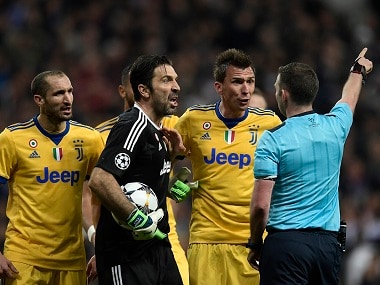Sergio Ramos had moved to the tunnel which leads to the Santiago Bernabeu pitch. After watching most of the match from the stands, he could not help himself, with his beloved team on the brink of a historic crash. The suspended defender risked another one-match ban but he chose to be as close to his teammates as possible.
While fury raged on the pitch following Cristiano Ronaldo’s decisive late goal, Ramos was told by Juventus manager Massimiliano Allegri that he should not be there. The Real Madrid skipper told him it was a clear penalty. Allegri responded, “Clear? Grey, at least."
[caption id=“attachment_4428617” align=“alignleft” width=“380”]  Juventus goalkeeper Gianluigi Buffon argues with the referee during the UEFA Champions League quarter-final second leg. AFP[/caption]
It’s in this vast grey area that the football stopped and arguments began. Gianluigi Buffon’s sending-off compounded matters, giving rise to a feeling of injustice felt strongly within the Juventus camp. Allegri did not deliver a harsh statement on the referee Michael Oliver. But after being denied a dream victory in the 93rd minute, Buffon was not going to hold back. “To award such a doubtful, or super doubtful, penalty just ahead of the final whistle and destroy the work of a team who gave absolutely everything, you have to have a rubbish bin instead of your heart… When I don’t feel I’m good enough, I put myself in a corner. He should do the same. It’s a matter of sensibility. It means you don’t know where you are, which teams are playing, you don’t know s**t. If you have the cynicism to award a penalty like that in the 93rd minute, you are not a man, you are an animal. The referee lost his head."
Strong words, but the tension of the moment cannot be overstated. Buffon, in what turned out to be his final Champions League game, was punished for letting the red mist descend on him. To be fair to Oliver, there was a case for both the penalty and the red card. And yet, there was a strong case not to.
It is usually overlooked in football that referees have plenty of grey areas to traverse. Matches are not policed exactly by the rule book and the situation, and the teams involved often influence decision making. It remains a well-established fact that home sides with big reputations get away with a lot more than others. Referees, try as they might, cannot and do not function robotically.
Impact Shorts
More ShortsThis is why the penalty decision was highly contentious. The pressure invoked by Real Madrid’s aura at home is considerable. Even the strong-willed may wilt. The point is not to say Oliver acted out of malice, but he did bow to pressure. To swing one way over a debatable decision is to tilt the balance of the tie considerably in favour of one side. Which is fair but its significance rises manifold in the final minute of a Champions League match going into extra-time.
Oliver was found to be lacking game awareness. The moment matters. There is precedence in football for not sending a player off or not awarding a penalty early in the match when there is ambiguity, or allowing play beyond added time when a team is in search of a goal. Seen in that light, Buffon’s reaction was adverse but not outrageous. A more conservative outlook from the referee would have taken the match into extra-time, something which would have been well advised.
Yet, there was a story beyond the penalty decision. It was of a complacent Madrid side which offered little in terms of a challenge throughout the match. Lessons from Barcelona’s defeat on the previous night were not heeded. As it turned out, even a 3-0 away win is not safe.
STORY CONTINUES BELOW THIS AD
In the first half, the hosts sorely missed the suspended the Sergio Ramos as Mario Mandzukic twice headed the ball in. There was no commanding presence in the air to counter the threat posed by Juventus. Furthermore, on Madrid’s left flank, Marcelo was constantly outnumbered as neither Isco nor Toni Kroos could shield him.
The numerical advantage was not on the flanks alone. In central midfield, Sami Khedira, Blaise Matuidi and Miralem Pjanic outnumbered Kroos and Casemiro. After going behind early, Madrid did respond strongly for a while, but it did not lead to a goal.
Zinedine Zidane was moved to shift away from the 4-4-2 formation. At half-time, Casemiro and an insipid Gareth Bale were hooked in favour of Lucas Vazquez and Marco Asensio. The substitutes brought greater energy to Madrid’s effort, even though the side found itself playing in a rare 4-4-1-1.
Juventus, though, went on to score a third goal, leaving Madrid dangerously on the brink of catastrophe. However, despite being miles ahead of Zidane’s side, Allegri’s players chose to protect their lead, rather than going for a fourth goal. The Juventus manager stuck by his players, even as they receded into their own half.
Madrid was encouraged. Isco, playing behind Cristiano Ronaldo, grew threatening while the introduction of Mateo Kovacic in central midfield at the expense of Luka Modric ostensibly made the hosts more secure. As chances started arriving, Juventus somehow hung on.
But like the last time it lost at the Bernabeu in the Champions League (against Schalke, in 2015/16), Madrid eventually secured progress. The decisive goal arrived in incredibly controversial circumstances and it will rankle Juventus for a long time to come.
Ronaldo, unlike almost everyone on the pitch, remained calm. As we know pretty well by now, he almost never fails when presented with a shot for glory. Real Madrid is in the semi-final again.


)

)
)
)
)
)
)
)
)



